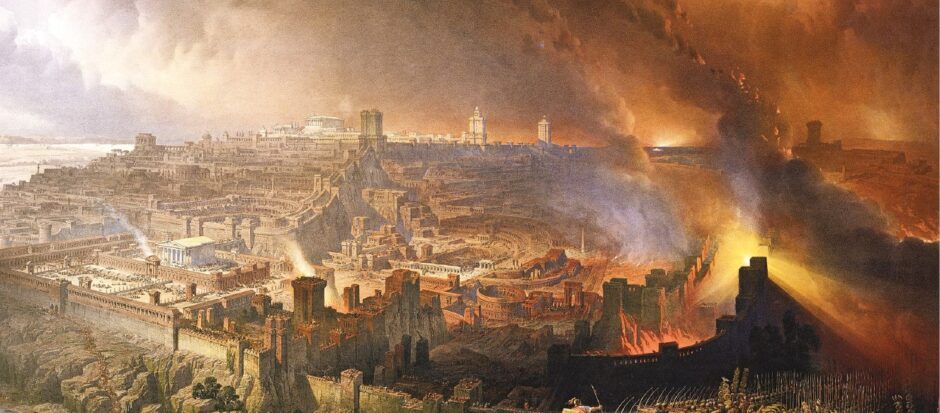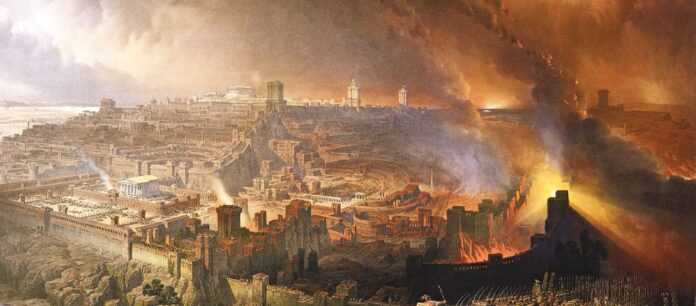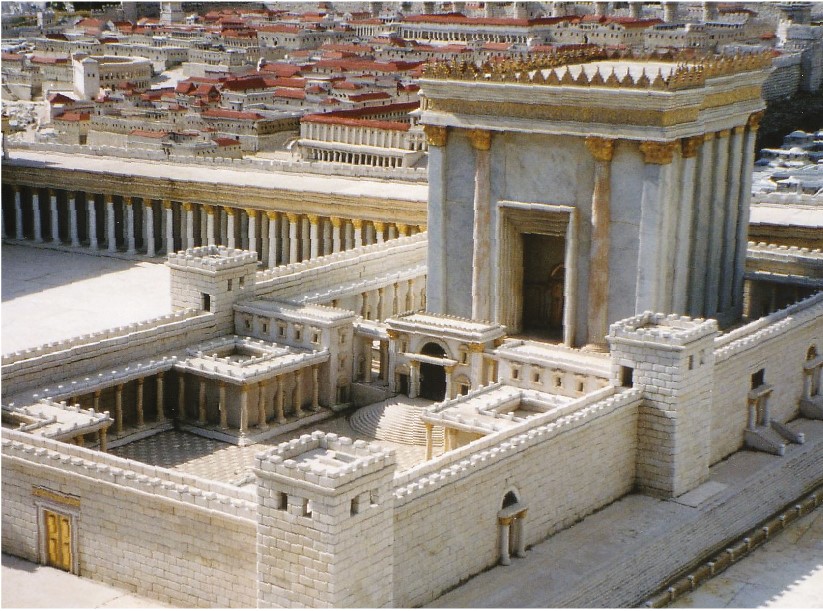THERE WAS AN OCCASION when Jesus’ disciples pointed out to him the splendid buildings of the Jerusalem temple. It was one of the wonders of the ancient world, and the Jews were immensely proud of it.
But he answered them, “You see all these, do you not? Truly, I say to you, there will not be left here one stone upon another that will not be thrown down.” As he sat on the Mount of Olives, the disciples came to him privately, saying, “Tell us, when will these things be, and what will be the sign of your coming and of the close of the age?” (Matthew 24:1–3).
Understandably, the disciples would have been alarmed at the warning that their fabulous temple was going to be destroyed. They wanted to know more. Jesus went on to tell them. Matthew 24 is often known as the ‘Olivet prophecy’ (because it was delivered on the Mount of Olives).
Jesus was concerned to warn his disciples about the impending destruction of the city of Jerusalem, which we now know took place in ad70.
Notice that the disciples asked two questions:
- When is Jerusalem to be destroyed?
- What will be the sign of your coming and the end of the age?
Duality
In his reply Jesus is answering both these questions, and the reply is such as to interweave the events of ad70 with the events of his second coming. In other words here we are introduced to a principle that is well known to Bible Students—the principle of ‘duality’, when things once spoken are twice true. Firstly in a local and restricted sense and then ultimately in a universal and complete sense.
An example of the principle is Psalm 2. If you read this Psalm you will see that it is a prophecy of the establishment of the Kingdom of God.
Why do the nations rage and the peoples plot in vain? The kings of the earth set themselves, and the rulers take counsel together, against the Lord and against his Anointed, saying, “Let us burst their bonds apart and cast away their cords from us.” He who sits in the heavens laughs; the Lord holds them in derision. Then he will speak to them in his wrath, and terrify them in his fury, saying, “As for me, I have set my King on Zion, my holy hill” (Psalm 2:1–6).
But if you look at Acts 4:25–26, you’ll see that the psalm is taken by the Apostles and applied to the opposition of the rulers to the preaching of Christ in their own time. It is an illustration of the principle of duality—Psalm 2 once spoken has (at least) two applications.
Destruction of Jerusalem
With this principle in mind, let’s turn back to the Olivet prophecy. We read in v. 22, ‘And if those days had not been cut short, no human being would be saved. But for the sake of the elect those days will be cut short.’ Jesus is saying that unless something happens to halt the process of the catastrophe everybody will be destroyed.
In fact this was true of the beleaguered city of Jerusalem in ad70. The Roman general Vespasian was pressing the siege of the city, but he was called home to Rome to be invested as Emperor, and the command was subsequently given to his son Titus. This resulted in a temporary relaxing of the siege, and some of its inhabitants did escape to the hills. This is now a matter of history, but the point to notice is that what was true in a local sense about the city of Jerusalem is intended to have a universal application about the second coming of Christ—that is to say the time will come again when unless something happens to halt the process again, then all humanity will be destroyed. Once true of Jerusalem—true again of the whole world.
What Jesus Christ predicted has come true in our generation. In the nuclear age we have the power to destroy the whole human race. We cannot put the clock back.

The important thing is that it is unique. We have never before had this power. Jesus said it would come and it was in reply to a question ‘what will be the sign of your coming?’. So here we have one unique event which cannot be confused with anything else nor with any other time. The power to destroy the human race—unless something happens to stop it.
Luke chapter 21 concerns the same subject: the destruction of Jerusalem and the second coming of Christ (for example vs. 6–7 and 20–28).
They will fall by the edge of the sword and be led captive among all nations, and Jerusalem will be trampled underfoot by the Gentiles, until the times of the Gentiles are fulfilled. And there will be signs in sun and moon and stars, and on the earth distress of nations in perplexity because of the roaring of the sea and the waves, people fainting with fear and with foreboding of what is coming on the world. For the powers of the heavens will be shaken. And then they will see the Son of Man coming in a cloud with power and great glory (Luke 21:24–27).
Revival of Israel
The events of ad70 were terrible and would result in a period (nearly 2000 years as it turned out) of the Jews being scattered throughout the whole world, and their capital city Jerusalem being trodden down and bereft. But notice there is a limitation placed upon this period. Jerusalem would not be in Gentile hands for ever.
The ‘times of the Gentiles’ were fulfilled in 1948, when the nation of Israel was re- established in its homeland. This event was a fulfilment of Jesus’ prophecy. It paved the way for what is to follow.
‘Signs in the sun and moon and stars’ and the ‘roaring of the sea and the waves’ could be a description of literal phenomena associated with the ‘space race’ and climate change. They could also be symbolic—in Bible language, heavenly bodies often stand for political rulers and the seas often stand for the nations.
Such things will come upon the earth that people will be ‘fainting with fear’ when they consider them. Notice especially ‘the powers of the heavens will be shaken’. Again this could be symbolic of political turmoil, but it could also describe a cataclysmic event that will shake the very firmament itself. Then what happens: ‘they will see the Son of Man coming in a cloud with power and great glory’.
These are the signs of the Lord’s coming and of the end of the age. A proliferation of weapons on a scale and of a kind which could destroy the whole human race so that ‘no human being would be saved’— such as has never happened before. And the fulfilment of the times of the Gentiles, when Jerusalem is again in the hands of the Jews.
The End of This Age
Finally let us consider the vision of the prophet Zechariah, who foresaw the terrible events of the ‘end of the age’. In chapter 14 he describes Jerusalem besieged once more (vs. 1–2) and brought to its knees. But this time there will be salvation: ‘Then the Lord will go out and fight against those nations as when he fights on a day of battle. On that day his feet shall stand on the Mount of Olives that lies before Jerusalem on the east…’ (vs. 3–4). This is none other than the second coming of Jesus Christ, in emphatic fulfilment of the prophecy of the angels who told his disciples that he would return to the Mount of Olives (Acts 1:10–11).
These are momentous times. People are ‘fainting with fear and with foreboding of what is coming on the world’. But the message of the Lord Jesus for his disciples was a message of encouragement: ‘Now when these things begin to take place, straighten up and raise your heads, because your redemption is drawing near’ (Luke 21:28).
The return of Christ will mean judgement for the world and destruction of his enemies, but it will usher in a new age of peace and justice in the Kingdom of God: ‘And the Lord will be king over all the earth. On that day the Lord will be one and his name one’ (Zechariah 14:9).
And those who have been faithful to Jesus Christ in this age will be the immortal rulers of that glorious age: ‘You were slain, and by your blood you ransomed people for God from every tribe and language and people and nation, and you have made them a kingdom and priests to our God, and they shall reign on the earth’ (Revelation 5:9–10).
Dennis Gillett
“But know this, that if the master of the house had known in what part of the night the thief was coming, he would have stayed awake and would not have let his house be broken into. Therefore you also must be ready, for the Son of Man is coming at an hour you do not expect.” Matthew 24:43–44




